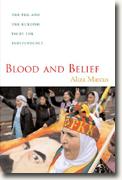Blood and Belief
Aliza Marcus
book reviews:
· general fiction
· chick lit/romance
· sci-fi/fantasy
· graphic novels
· nonfiction
· audio books
· author interviews
· children's books @
curledupkids.com
· DVD reviews @
curledupdvd.com
newsletter
win books
buy online
links
home
for authors
& publishers
for reviewers

 |
Blood and Belief: The PKK and the Kurdish Fight for Independence Aliza Marcus NYU Press Hardcover 368 pages August 2007 |
|
The world’s approximately 28 million Kurds are scattered over Turkey, Iran, Iraq, and Syria. They have no home of their own. Over the last several decades, they have sought to use both nonviolent and violent means to bring their dream - the creation of an independent Kurdistan - to fruition. More than half of the world’s Kurds live in Turkey. Even so, since the founding of modern Turkey in 1923, the Turkish government has refused to recognize the Kurds as a separate ethnic entity. This same government has severely proscribed the normal day-to-day activities of the Kurdish people. As such, the Turkish Kurds have borne a well-founded grievance against the Turkish government. This grievance resulted, inter alia, in the founding of the Kurdistan Worker’s Party, or the PKK, under Abdullah Ocalan in 1978.
Soon after the founding of the PKK, Ocalan became persona non grata in Turkey and was forced to leave the country. Ocalan escaped to Syria and spent almost two decades directing the affairs of the PKK from the outskirts of the Syrian capital of Damascus. With Syrian support, Ocalan gradually proceeded to build the PKK into a fearsome fighting force that was able not only to launch guerilla attacks against the Turkish army with great aplomb but was also able, when necessary, to make life militarily difficult for opposing Kurdish groups in northern Iraq and Iran. Ocalan became the supreme leader of the PKK, and the author does a good job of chronicling the fact that he tolerated no dissent, rarely listened to opposing viewpoints, and had no hesitation whatsoever in executing real and imagined enemies both within and outside the PKK. Throughout the 1980s, the PKK gradually consolidated its power, which reached its zenith in the early 1990s. In this connection, the author rightly notes that various events occurred throughout the 1980s that increasingly made those who argued for “peaceful resistance to Turkish policies” irrelevant. For instance, Saddam Hussein’s 1988 chemical attack against Iraqi Kurds in Hallabja and the world’s disquieting silence were clear signs to Ocalan that the Kurds could not “rely on others to protect them.” With increasing military success against the Turkish army in the early 1990s, Ocalan decided - with his now well established dictatorial powers - that he would widen the scope of the struggle against Turkey dramatically so that the Turkish government could no longer claim to control the Kurdish region in southeastern Turkey. For its part, the Turkish government under President Turgut Ozal seemed to be ready to adopt a different approach to the “Kurdish problem.” Unfortunately, any hopes of a rapprochement between the PKK and the Turkish government disappeared with the unexpected death of President Ozal in 1993. From 1993 to 1997, the Turkish army gradually seized the initiative from the PKK with increasingly successful military forays into PKK controlled territory. Soon thereafter, Turkey exerted great pressure on Syria to expel Ocalan from his home of the last two decades. This expulsion marked the beginning of the end for Ocalan. The author clearly delineates the trials and tribulations faced by Ocalan as he journeyed across several inhospitable European nations, ultimately ending up in the hands of Turkish agents in Nairobi, Kenya. Despite Ocalan’s present incarceration and the PKK’s diminished stature, his party remains popular. The author perceptively points out that this is because the PKK’s fight put the Kurdish problem on the agenda in Turkey and in the rest of the world. “It helped Kurds define themselves as Kurds,” and it gave them “a sense of honor.” This book says relatively little about how the PKK was able to generate funds to carry out its myriad activities over extended periods of time. In addition, the book is silent on a potentially salient recent development, i.e., the relationship between Turkey’s Kurds and the Turkish Justice and Development Party. However, these are small blemishes in what is otherwise a meticulously researched, well-written, and altogether excellent account of the PKK and the Kurdish fight for independence. Originally published on Curled Up With A Good Book at www.curledup.com. © Amitrajeet A. Batabyal, 2007 |
|
|
|
 Click here to learn more about this month's sponsor! |
|
| fiction · sf/f · comic books · nonfiction · audio newsletter · free book contest · buy books online review index · links · · authors & publishers reviewers |
|
| site by ELBO Computing Resources, Inc. | |
 As the author helpfully points out, from the very outset, PKK leader Ocalan had little regard for the use of nonviolent means to attain the goal of Kurdish independence. In his many speeches, he lost no opportunity to point out that previous Kurdish uprisings in Turkey had failed because they were “neither sufficiently socialist nor truly national liberation struggles.” Along with the Turkish state, Ocalan blamed the relatively wealthy Kurdish landowners for denying Kurds their right to an independent state.
As the author helpfully points out, from the very outset, PKK leader Ocalan had little regard for the use of nonviolent means to attain the goal of Kurdish independence. In his many speeches, he lost no opportunity to point out that previous Kurdish uprisings in Turkey had failed because they were “neither sufficiently socialist nor truly national liberation struggles.” Along with the Turkish state, Ocalan blamed the relatively wealthy Kurdish landowners for denying Kurds their right to an independent state.